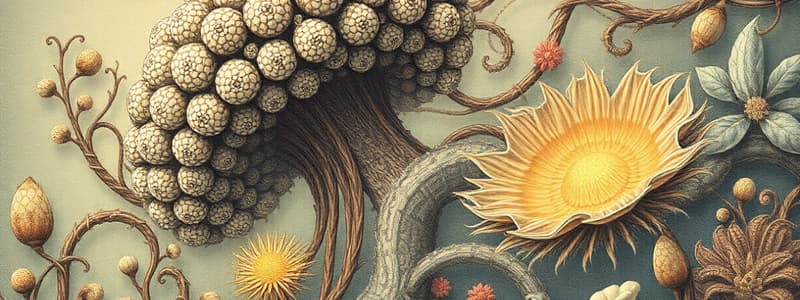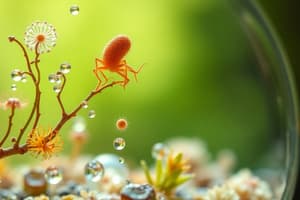Podcast
Questions and Answers
What role do microorganisms play in food production?
What role do microorganisms play in food production?
- They contribute to fermentation processes. (correct)
- They provide essential vitamins to humans.
- They absorb nutrients directly from the soil.
- They prevent spoilage of all food types.
Which statement accurately describes the role of microorganisms in bioremediation?
Which statement accurately describes the role of microorganisms in bioremediation?
- They act only as transporters for pollutants.
- They can digest and break down harmful substances. (correct)
- They increase the toxicity of pollutants.
- They create new pollutants during the process.
What is a primary negative effect of pathogenic microorganisms?
What is a primary negative effect of pathogenic microorganisms?
- They cause infectious diseases. (correct)
- They enhance food flavor.
- They promote soil fertility.
- They assist in nitrogen fixation.
How do microorganisms contribute to nitrogen fixation?
How do microorganisms contribute to nitrogen fixation?
Which interaction type describes microorganisms that benefit from another without impacting it negatively?
Which interaction type describes microorganisms that benefit from another without impacting it negatively?
What is a common consequence of food spoilage caused by microorganisms?
What is a common consequence of food spoilage caused by microorganisms?
Which of the following is NOT a role of beneficial microorganisms?
Which of the following is NOT a role of beneficial microorganisms?
What type of reaction occurs when microorganisms trigger allergic responses?
What type of reaction occurs when microorganisms trigger allergic responses?
Flashcards
What are microorganisms?
What are microorganisms?
Microscopic living organisms, like bacteria, viruses, fungi, archaea, and protists.
What is decomposition?
What is decomposition?
The process by which microorganisms break down dead organic matter, releasing nutrients back into the environment.
What is nitrogen fixation?
What is nitrogen fixation?
The conversion of atmospheric nitrogen into a usable form for plants by certain bacteria.
How can microorganisms be harmful?
How can microorganisms be harmful?
Signup and view all the flashcards
What are pathogens?
What are pathogens?
Signup and view all the flashcards
What are symbiotic relationships?
What are symbiotic relationships?
Signup and view all the flashcards
What is mutualism?
What is mutualism?
Signup and view all the flashcards
What is commensalism?
What is commensalism?
Signup and view all the flashcards
Study Notes
Introduction
- Microorganisms, or microbes, are microscopic living organisms.
- They include bacteria, viruses, fungi, archaea, and protists.
- Their size necessitates use of a microscope for observation.
- They are ubiquitous in the environment, inhabiting air, water, soil, and living organisms.
Microorganisms as Friends
-
Many microorganisms play crucial roles in various ecological processes and contribute significantly to human welfare.
-
Decomposition: Microorganisms facilitate decomposition of organic matter, releasing essential nutrients back into the ecosystem. This is vital for nutrient cycling in nature and maintaining soil fertility.
-
Nitrogen Fixation: Certain bacteria convert atmospheric nitrogen into a usable form for plants. This process is fundamental for plant growth and agricultural productivity.
-
Food Production: Microorganisms contribute to food production in numerous ways, including fermentation processes for cheese, yogurt, bread, and alcoholic beverages.
-
Bioremediation: Some microorganisms can break down pollutants, making them less harmful to the environment. This ability can be harnessed for cleaning up contaminated sites.
-
Medicine: Many microorganisms produce antibiotics and other valuable pharmaceuticals. These compounds are vital for combating bacterial infections and related ailments.
-
Biotechnology: Microorganisms are used in various biotechnological processes, including genetic engineering and protein production.
Microorganisms as Foes
-
Pathogenic microorganisms can cause diseases in humans, animals, and plants.
-
Infectious Diseases: Many microorganisms (bacteria, viruses, fungi, parasites) cause various infectious diseases. These diseases range in severity, from mild to life-threatening.
-
Food Spoilage: Bacteria, fungi, and some viruses can cause food spoilage by producing toxins or altering the food's texture and taste.
-
Agricultural Losses: Pathogenic microorganisms can damage crops and livestock.
-
Environmental Pollution: Some microorganisms release harmful toxins that can contaminate the environment.
-
Allergic Reactions: Microorganisms, even those that do not cause direct infection, can trigger allergic reactions in sensitive individuals.
Microorganism Interactions
- Microorganisms interact with each other and with other organisms in complex ways.
- Symbiotic relationships are common, involving mutualistic, commensal, and parasitic interactions.
- Competition for resources can also occur between different microbial groups.
Studying That Suits You
Use AI to generate personalized quizzes and flashcards to suit your learning preferences.




